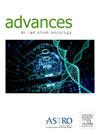Provider Practices and Perceived Barriers and Facilitators in Improving Quality Practices in Radiation Oncology Peer Review
IF 2.2
Q3 ONCOLOGY
引用次数: 0
Abstract
Purpose
Radiation oncology peer review evaluates case-specific qualitative treatment planning decisions. We sought to understand interdisciplinary perspectives on peer review to identify factors affecting stakeholder engagement and implementation of recommendations.
Materials and Methods
Semistructured interviews and Likert surveys (scaled, 0-10) with radiation oncology peer review participants were audio-recorded and transcribed. Two independent coders utilized a grounded theory approach to extract dominant themes.
Results
Participants included 6 academic and 3 community radiation oncologists, 2 residents, 2 medical physicists, 2 radiation therapists, 4 dosimetrists, and 1 industry representative. Thematic priorities of peer review included adherence to institutional guidelines, clinical background to inform decision-making, detection of rare errors, and education. Key facilitators included pretreatment peer review, clear planning guidelines, and feedback on peer recommendations. Barriers to recommendation adoption included resource limitations and a lack of prospective data guiding qualitative recommendations. Participants perceived benefits of peer review were assessed with Likert surveys with higher values placed on reducing practice variation (8.0) and education (7.6) and a lower value placed on the detection of medical errors (7.4) and reduction of treatment delivery incidents (6.9). When comparing Likert scores by participant role, nonphysicians rated the overall importance of peer review (mean, 9.8 vs 6.5, P = .03) and education (mean, 9.0 vs 6.7, P = .02) significantly higher than physicians.
Conclusion
Participants in radiation oncology acknowledged the importance of peer review, but there was significant variation in the perceived benefits. A higher value was placed on the alignment of clinical practice and nonphysician participant education. Future processes to improve communication and prospective plan review were identified as beneficial to peer review-mediated plan changes.
求助全文
约1分钟内获得全文
求助全文
来源期刊

Advances in Radiation Oncology
Medicine-Radiology, Nuclear Medicine and Imaging
CiteScore
4.60
自引率
4.30%
发文量
208
审稿时长
98 days
期刊介绍:
The purpose of Advances is to provide information for clinicians who use radiation therapy by publishing: Clinical trial reports and reanalyses. Basic science original reports. Manuscripts examining health services research, comparative and cost effectiveness research, and systematic reviews. Case reports documenting unusual problems and solutions. High quality multi and single institutional series, as well as other novel retrospective hypothesis generating series. Timely critical reviews on important topics in radiation oncology, such as side effects. Articles reporting the natural history of disease and patterns of failure, particularly as they relate to treatment volume delineation. Articles on safety and quality in radiation therapy. Essays on clinical experience. Articles on practice transformation in radiation oncology, in particular: Aspects of health policy that may impact the future practice of radiation oncology. How information technology, such as data analytics and systems innovations, will change radiation oncology practice. Articles on imaging as they relate to radiation therapy treatment.
 求助内容:
求助内容: 应助结果提醒方式:
应助结果提醒方式:


